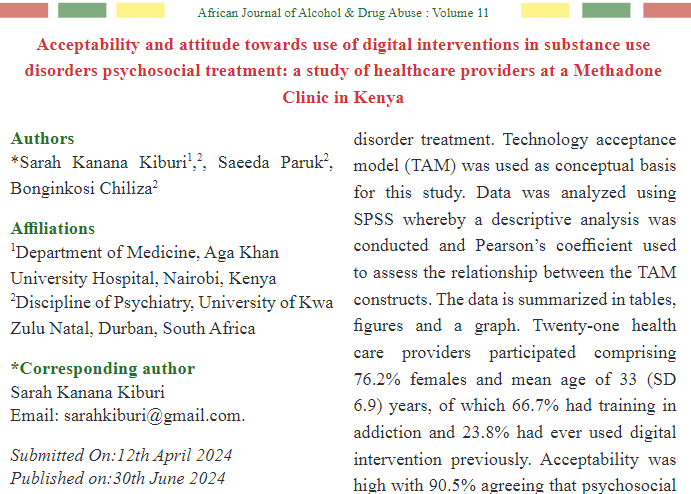 December 2024: Paper of the Month by Kiburi et al. 2024 – Healthcare Providers’ Positive Attitudes Toward Digital Interventions in Substance Use Disorder Treatment: Insights from a Nairobi Methadone Clinic Study
December 2024: Paper of the Month by Kiburi et al. 2024 – Healthcare Providers’ Positive Attitudes Toward Digital Interventions in Substance Use Disorder Treatment: Insights from a Nairobi Methadone Clinic Study
A recent study by Kiburi et al. (2024) titled “Acceptability and attitude towards use of digital interventions in substance use disorders psychosocial treatment: a study of healthcare providers at a Methadone Clinic in Kenya” published in the African Journal of Alcohol and Drug Abuse, shows that healthcare providers at Nairobi’s methadone clinic exhibit high acceptability and positive attitudes toward using digital interventions for psychosocial SUD treatment.
“
Healthcare providers at a Nairobi methadone clinic demonstrate high acceptability and positive attitudes towards digital interventions for substance use disorders.– Kiburi et al. 2024
The article explores the acceptability and attitude towards the use of digital interventions in the psychosocial treatment of substance use disorders (SUDs) in Kenya. The study was conducted among healthcare providers at a methadone clinic in Nairobi. It aimed to assess their views on the use of digital interventions for treating SUDs, particularly opioid use disorder (OUD). The study found high acceptability and positive attitudes towards digital interventions among healthcare providers. Most participants believed that digital interventions could improve access to treatment, be cost-effective, and benefit patients. The study used the Technology Acceptance Model (TAM) to analyze the data, showing that perceived ease of use and perceived usefulness were associated with positive attitudes and intentions to use digital interventions.
How the Study was Conducted
The participants were healthcare providers at the methadone clinic, including medical officers, clinical officers, nurses, pharmacists, addiction counselors, clinical psychologists, laboratory technologists, and medical social workers. Out of 25 eligible healthcare providers, 21 participated in the study. The authors employed a structured self-administered questionnaire to collect data. The questionnaire included sociodemographic variables and questions on the acceptability and attitude towards the use of digital interventions in substance use disorder (SUD) treatment. The Technology Acceptance Model (TAM) was used as the conceptual basis for the study.
Variables Measured:
Sociodemographic Data: Age, gender, cadre, prior training in mental health or addiction, and prior experience with digital interventions.
Attitude: Participants’ perceptions of various treatments for SUD and opioid use disorder (OUD), the effectiveness of digital interventions, and their cost-effectiveness.
Acceptability: Willingness to use or refer patients to digital interventions for psychosocial treatment of OUD and confidence in using a text-based intervention.
The authors analyzed data using SPSS. Descriptive analysis was conducted, and Pearson’s coefficient was used to assess the relationship between the TAM constructs. The statistical significance was set at p < 0.05. Ethical approval was obtained from the University of Nairobi and Kenyatta National Hospital ethics committee, the University of KwaZulu Natal Biological Research Ethics Committee, and other relevant bodies. Written informed consent was obtained from all participants.
What the Authors Found
The authors found that there was a high acceptability and positive attitude towards the use of digital interventions for psychosocial treatment of substance use disorders (SUDs) among healthcare providers at the methadone clinic in Nairobi, Kenya. The study also found that 90.5% of participants agreed that psychosocial treatment can be provided through digital interventions, and 80.9% believed that digital interventions would improve access to treatment. Additionally, 76.2% viewed digital interventions as cost-effective.
Why is this important?
Addressing Treatment Gaps: Substance use disorders (SUDs) are prevalent globally and locally, with significant treatment gaps. Digital interventions can help bridge these gaps by providing accessible and cost-effective treatment options.
Positive Attitudes and High Acceptability: The study found high acceptability and positive attitudes towards digital interventions among healthcare providers. This indicates a readiness to adopt these technologies, which can improve treatment outcomes for individuals with SUDs.
Technology Acceptance Model (TAM): The study used the TAM to analyze the data, showing that perceived ease of use and perceived usefulness were associated with positive attitudes and intentions to use digital interventions. This highlights the importance of designing user-friendly and beneficial digital interventions.
Policy and Practice Implications: The findings can inform the design and implementation of digital interventions in Kenya and similar settings. By demonstrating the acceptability and potential benefits of these interventions, the study can guide policymakers and healthcare providers in integrating digital technologies into routine care.
Training and Support: The study emphasizes the need for training healthcare providers on the benefits and implementation of digital interventions. This can enhance their confidence and competence in using these technologies, ultimately improving patient outcomes.
What the Authors Recommend
- The authors emphasize the importance of training healthcare providers on the benefits and implementation of digital interventions. This training can enhance the perceived ease of use and positive attitudes towards these technologies, leading to better uptake and use.
- The study advocates that the findings can guide the development of policies to implement digital interventions among individuals with substance use disorders (SUDs). This can help improve treatment outcomes and address the treatment gap in Kenya.
- The authors suggest conducting further research to gain additional insights into the use of digital interventions in SUD treatment. Future studies should include larger samples and multiple healthcare facilities to compare findings and allow for generalizability. They also recommend using qualitative methods to explore various perceptions in more depth.
- In addition, the authors highlight the importance of involving healthcare providers and patients in the design of digital interventions. This can ensure that the interventions are tailored to the needs and preferences of the users, leading to higher acceptability and effectiveness.
In conclusion, the study by Kiburi et al. (2024) highlights the promising potential of digital interventions in addressing treatment gaps for substance use disorders in Kenya. The high acceptability and positive attitudes among healthcare providers at Nairobi’s methadone clinic underscore the readiness to embrace these technologies in psychosocial treatment. By leveraging user-friendly and effective digital tools, supported by training and policy development, significant strides can be made in improving access to and outcomes of SUD treatment. Future research and stakeholder collaboration will be crucial in scaling and tailoring these interventions to meet the unique needs of diverse populations, ultimately transforming addiction care in resource-limited settings.
















 The African Research (AR) Index is a comprehensive scholarly directory and database focused explicitly on journal publishers that publish and disseminate African research.
The African Research (AR) Index is a comprehensive scholarly directory and database focused explicitly on journal publishers that publish and disseminate African research.

